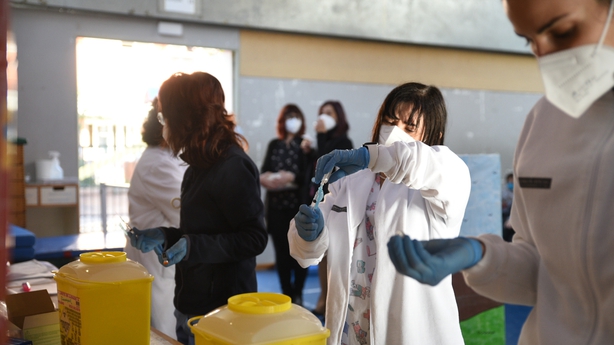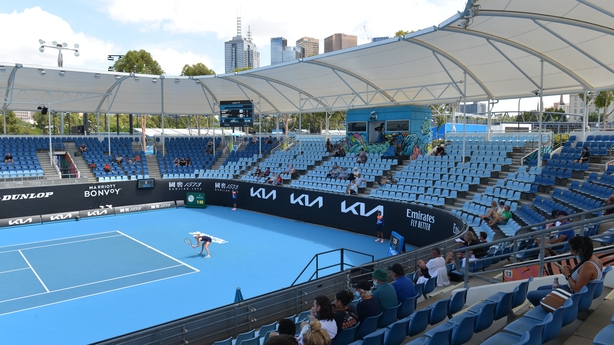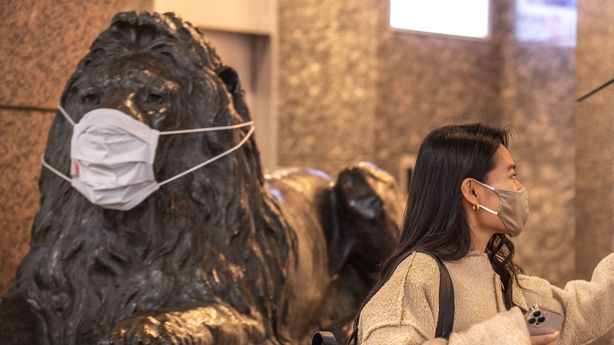Spain is leading calls for governments to start tackling Covid-19 as any other endemic respiratory virus like seasonal flu, despite opposition from the World Health Organization and warnings that the approach is premature.
With governments and populations worldwide desperate for an end to the pandemic, discussion about when the virus might be reclassified has intensified.
"Spain wants to lead this debate because it is timely and necessary to do so," Health Minister Carolina Darias has said, adding that Spain asked the European Centre for Disease Prevention (ECDC) to "study new strategies" to deal with Covid-19.
Spain is in a good position to open the debate, having one of the world's highest vaccination rates with 90.5% of its population over the age of 12 fully immunised.
But the question has sparked disagreement between governments seeking some sort of normality and some parts of the medical community which advocate keeping its guard up.
Spain's left-wing government has been a prominent advocate of reclassifying Covid as an endemic disease with milder seasonal outbreaks that humanity can live with, like the flu.
The country is working with the scientific community to eventually shift from "managing a pandemic to managing a disease which we hope science will reclassify as an endemic illness", Spanish Prime Minister Pedro Sanchez said this week.
Although Omicron has triggered a surge in infections, there have been fewer deaths and lower rates of hospital admissions, with many governments easing restrictions, reducing isolation times and loosening border controls.
"As Covid becomes endemic, we will need to replace legal requirements with advice and guidance," British Prime Minister Boris Johnson said yesterday, announcing that restrictions were being lifted in England.
Arguing "we must learn to live with Covid" in a similar way to seasonal flu, British Health Secretary Sajid Javid said the government would set out a long-term plan for living with coronavirus within months.
On Tuesday, however, WHO chief Tedros Adhanom Ghebreyesus insisted that the pandemic was "nowhere near over", warning that new variants were still "likely to emerge".
The UN health organisation also warned against the temptation to play down the seriousness of an endemic disease.
"Endemic in itself does not mean good -- endemic just means it's here forever," the WHO's emergencies director, Dr Michael Ryan, told the Davos Agenda roundtable on vaccine equity, citing malaria as an example.
Fernando Garcia, an epidemiologist and the spokesman of a public health association, warned that talk of treating Covid-19 as an endemic illness at this stage was "creating false hope".
"We are indeed moving towards the virus becoming more endemic, but we cannot say we have already reached that status," said Marco Cavaleri, head of the European Medicines Agency's (EMA) vaccination strategy.
There is no numerical threshold that distinguishes between an epidemic and a disease which is endemic, he said.

In Spain, more than 23% of intensive care beds are taken up by Covid patients and more than 91,000 people have died since the pandemic first took hold in March 2020.
Some healthcare professionals have backed the Spanish government's approach.
"Let's stop visiting and testing healthy people with mild symptoms, or tracking and testing their contacts, let's abandon self-isolation and quarantine," urged a recent article by SemFYC, which represents around 19,000 family medicine specialists.
"All these activities... have been rendered meaningless with acquired immunity (both through infection and through vaccination) and the arrival of Omicron," it said.
Australian Open organisers deny slack Covid testing
Australian Open organisers have insisted that their Covid-19 protocols have been "really successful" despite some top players pointing to lax testing at the first Grand Slam of 2022.
Frenchman Ugo Humbert has tested positive and world number three Alexander Zverev of Germany believes there is probably more contagion going undetected.
The tournament director said all players had to test on arrival then again between day five and seven of the 17 to 30 January competition whose start was overshadowed by the deportation of unvaccinated men's world number one Novak Djokovic.

"On top of that there's mandatory symptom testing and every single day each player is provided with an antigen kit that they can pick up at hotel or here on site," Craig Tiley told Australia's Channel 9.
"So far it's worked well and it's been really successful."
However, two-time Grand Slam winner Garbine Muguruza also spoke of slack protocols, saying testing was optional at the Melbourne Park major with results not regularly monitored.
"I test every two days by myself in my room," the Spaniard said today. "It's not mandatory. I still do it."
Greek Stefanos Tsitsipas, ranked fourth, said it was the athletes' responsibility.
"I have been trying to get a few antigen tests and rapid tests to see whether or not I'm positive, which is a responsibility that I have, it's something that I have to do in order to see if I'm 100%," he added.
Australia today reached 2 million cases in the pandemic, though deaths have been relatively low by international standards at just over 2,900.
"Right throughout the year, the players have been travelling around the world and there have been protocols they have been following that have enabled them to do that," Mr Tiley added, saying Australia's protocols were even more rigorous.
Japan's Osaka and two more regions expected to request Covid-19 measures
Japan's western prefecture of Osaka and two neighbouring regions are expected to join in a widening declaration of Covid-19 prevention measures, Osaka's governor has said.
Japan added more than 41,000 new Covid-19 infections yesterday as the Omicron variant spread, a tally by national broadcaster NHK showed, breaking a record for two consecutive days.
Prime Minister Fumio Kishida decided to expand the measures to cover the capital Tokyo and a dozen other regions.

If the restrictions are widened to include Osaka and its two neighbours, 63% of the nation's total population – or just under 80 million people - would live under the measure.
Governor Hirofumi Yoshimura said the prefecture would hold a meeting tomorrow to determine whether to apply for measures referred to as quasi-emergency that allow governors to request restaurants and bars shorten business hours and stop serving alcohol.
Mr Yoshimura said he was coordinating with the prefectural governors of Kyoto and Hyogo on making a joint request.
"I think the three prefectures will probably join together to request the quasi-emergency measures," he said.
Mr Yoshimura said he expected Osaka would log roughly 6,000 new infections today, close to the record number seen yesterday.

